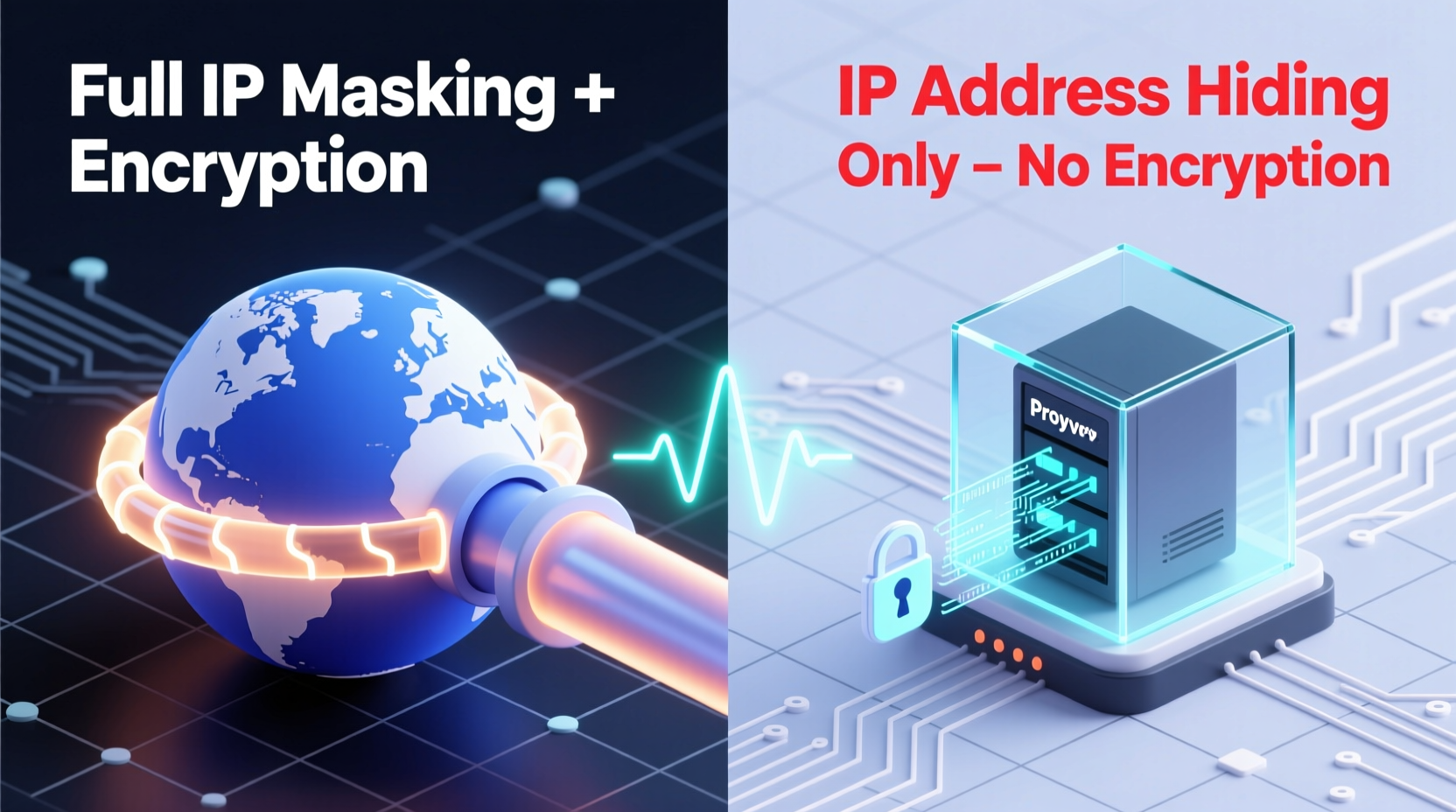In an era where digital privacy is under constant threat, many users turn to tools like proxies and virtual private networks (VPNs) to mask their IP addresses and browse more anonymously. While both claim to hide your identity online, they differ drastically in how they work, what level of security they offer, and whether they actually protect your data from prying eyes. Understanding these differences is essential if you're serious about online safety.
Your IP address acts as a digital fingerprint, revealing your approximate location, internet service provider, and browsing habits. Cybercriminals, advertisers, governments, and even websites can use this information to track or target you. So when choosing between a proxy and a VPN, it’s not just about hiding your IP—it's about doing so securely and consistently across all your online activity.
How Proxies Work—and Where They Fall Short

A proxy server functions as an intermediary between your device and the internet. When you connect through a proxy, your traffic is routed through that server before reaching its destination. Websites see the proxy’s IP address instead of yours, giving the appearance of anonymity. However, this masking is superficial and often misleading.
Most proxies only handle traffic from specific applications—typically web browsers—and don’t encrypt your connection. This means anyone monitoring your network, such as your ISP or a public Wi-Fi operator, can still see exactly what you’re doing online. HTTP and SOCKS proxies are common types, but neither provides end-to-end encryption by default.
Because proxies lack encryption, your data remains exposed. Even if your IP appears hidden from the destination website, your actual activity isn’t protected. Furthermore, many proxy services operate with minimal oversight, making them prime candidates for malicious behavior. Some have been found injecting ads, tracking cookies, or malware into user traffic.
How VPNs Provide Real Security
Unlike proxies, a Virtual Private Network (VPN) creates an encrypted tunnel between your device and a remote server operated by the VPN provider. All your internet traffic—whether from your browser, email client, or streaming app—is funneled through this secure tunnel. The result? Your IP address is replaced with the VPN server’s, and your data becomes unreadable to third parties.
Modern VPNs use strong encryption protocols like OpenVPN, WireGuard, or IKEv2/IPsec to safeguard your connection. These protocols ensure that even if someone intercepts your traffic, they cannot decipher its contents without the decryption key. This makes VPNs far superior for protecting against surveillance, data theft, and censorship.
Additionally, reputable VPN providers follow strict no-logs policies, meaning they do not store records of your online activities. This commitment to privacy ensures that even the provider itself cannot trace your actions back to you. Look for independently audited services based in privacy-friendly jurisdictions like Switzerland or the British Virgin Islands for maximum trustworthiness.
“Encryption is non-negotiable when it comes to hiding your identity online. A proxy might change your IP, but only a properly configured VPN ensures your entire session stays private.” — Dr. Lena Torres, Cybersecurity Researcher at the Digital Privacy Institute
Key Differences: Proxy vs. VPN
| Feature | Proxy | VPN |
|---|---|---|
| IP Masking | Limited to specific apps | System-wide coverage |
| Encryption | No (unless using HTTPS) | Yes (end-to-end) |
| Traffic Coverage | Browsers or single apps | All device traffic |
| Security Against ISPs | None | Full protection |
| Logging Practices | Often logs user data | No-logs policy (reputable providers) |
| Speed Impact | Minimal (no encryption) | Moderate (due to encryption) |
| Use Case | Bypassing geo-blocks (low-risk) | Secure browsing, torrenting, remote access |
This comparison shows that while proxies may seem faster due to lack of encryption, they sacrifice critical layers of protection. For casual tasks like checking region-restricted news sites, a proxy might suffice—but only if you fully understand the risks involved.
Real-World Scenario: Sarah’s Online Shopping Experience
Sarah wanted to access a limited-time deal on a U.S.-only e-commerce site while traveling in Europe. She found a free web proxy advertised as “anonymous” and used it to change her apparent location. The deal loaded successfully, and she proceeded to enter her credit card details.
Unbeknownst to her, the proxy did not encrypt her connection. Her payment information was transmitted in plain text over the public hotel Wi-Fi. Later that week, unauthorized charges appeared on her statement. An investigation revealed that the proxy server had logged and sold her session data to a third party.
Had Sarah used a trusted VPN instead, her entire transaction would have been encrypted, shielding her financial data from interception. This case illustrates how false confidence in basic IP masking can lead to serious consequences.
Choosing the Right Tool: A Practical Checklist
Selecting between a proxy and a VPN shouldn’t be arbitrary. Consider your goals, threat model, and technical needs. Use the following checklist to make an informed decision:
- Do you need full-device protection? → Choose a VPN
- Are you handling sensitive data (login credentials, payments)? → Only use a VPN
- Is speed your top priority and security secondary? → A proxy might work—for non-sensitive tasks
- Do you want to bypass censorship in restrictive countries? → Use a reliable, obfuscated VPN
- Are you torrenting or using P2P networks? → Always use a secure, no-logs VPN
- Can you verify the provider’s logging policy? → Avoid any service without transparent privacy practices
- Is the tool free? → Be cautious—free proxies and VPNs often monetize your data
Step-by-Step: Setting Up Secure IP Protection
If you're ready to properly hide your IP address with genuine security, follow these steps:
- Assess your needs: Determine whether you require system-wide encryption (e.g., for remote work) or just web-level anonymity (e.g., price comparison).
- Research providers: Look for well-established VPN services with independent audits, clear privacy policies, and support for modern protocols like WireGuard.
- Avoid freemium traps: Free versions of popular tools often come with data caps, slower speeds, and weaker security. Pay for a premium plan if privacy matters.
- Install the official app: Download the app directly from the provider’s website—not third-party stores—to avoid tampered versions.
- Enable kill switch and DNS leak protection: These features prevent accidental exposure if the connection drops.
- Test your setup: Visit sites like dnsleaktest.com or ipleak.net to confirm your real IP isn’t being exposed and DNS queries aren’t leaking.
- Stay updated: Regularly update the app and your operating system to patch vulnerabilities.
This process ensures that your IP address remains hidden not just from websites, but also from snoopers on your local network and beyond.
Frequently Asked Questions
Can a proxy hide my IP address completely?
A proxy can hide your IP address from the destination website, but it does not encrypt your traffic or protect other aspects of your connection. Your ISP, network administrator, or hackers on shared networks can still see what you're doing. Additionally, many proxies log user data, which defeats the purpose of anonymity.
Does a VPN always hide my IP address?
Yes, when functioning correctly, a VPN replaces your real IP address with that of its server. However, leaks can occur due to misconfiguration, outdated software, or disabled security settings. Always perform periodic leak tests to ensure consistent protection.
Is it illegal to use a proxy or a VPN to hide my IP?
In most democratic countries, using either tool is legal. However, some nations—including China, Russia, and Iran—restrict or ban certain types of anonymizing technologies. Always check local laws before connecting, especially when traveling.
Final Thoughts: Security Over Illusion
Hiding your IP address is only meaningful when done securely. A proxy offers the illusion of privacy—convenient for quick fixes but dangerously inadequate for real protection. In contrast, a trustworthy VPN delivers comprehensive encryption, consistent IP masking, and defense against surveillance, making it the only viable choice for anyone concerned about digital privacy.
The internet is no longer just a place for browsing; it's where we manage finances, communicate privately, and express ourselves freely. Protecting your identity shouldn't be optional or half-measured. Invest in tools that prioritize your security, not just your apparent location.









 浙公网安备
33010002000092号
浙公网安备
33010002000092号 浙B2-20120091-4
浙B2-20120091-4
Comments
No comments yet. Why don't you start the discussion?